
A Guide to ASTROLOGY
Astrology is an umbrella term for a number of different but closely related, theories about the physical universe. The most popular is astronomy, which seeks to discover the exact position and orientation of heavenly objects by studying their relative movement across the night skies. Astronomy is an ancient science that goes back at least 4000 years, although exact details are hard to uncover. Astrology, on the other hand, is an alternative scientific theory that seeks to divine specific information about earthly events and human affairs by studying the subtle movements and relative positions of heavenly objects.
Though there are many schools of thought that believe in astrology, not everyone who claims to practice astrology actually understands it. Many people merely follow astrologers’ advice when they believe that a particular situation will result in certain consequences. For example, if you were told that the next birthday party is on a Friday, you might declare to yourself that this is indeed the day of your next birthday. You’d be right, but astrologers know better and, hence, declare today’s date as the actual astrological time.
Astrology can be seen as the study of the placement of celestial bodies in the sky and how they influence human events. While the precise placement of the planets may never be known (some believe that the planets were placed by chance), all of the planets have a significant effect on human life. These events are influenced by the Sun, the largest of the solar system, the Earth, Mars, Jupiter, Saturn, Uranus, Neptune, and Pluto. The Sun’s impact on our lives is responsible for the annual day of celebration of July 4th. The Sun’s gravitational pull on the other planets can influence the movements of the stars and, by extension, the movements of the planets in the entire Milky Way Galaxy.
The planets Mercury, Venus, and Mars, and their relative positions in the sky, are primarily responsible for the birth of all the beings who have come into being. By studying their positioning, you can learn about yourself and your family background. There’s a long and interesting history attached to all these events and, although there are many theories on astrology, only a small number of them actually work to prove astrology. By understanding exactly which planet or star is impacting which event, you can use this information to foretell your future.
The placement of the planets Jupiter, Saturn, Uranus, Neptune, and Pluto is especially important when learning about ASTROLOGY. These planets are situated in a plane that revolves around the earth, and each one represents a different aspect of life. For example, if you place a planet in the “other” hand, it means that you will have a difficult time dealing with certain situations. If you place a planet in the “sun” hand, you will have an easier time achieving goals and developing relationships. The same goes for the “moon” hand, which represents the ability to achieve great fame and fortune, while the “hand of Mercury” represents your artistic temperament and personal character.
If you think that astrology has a little bit too much nonsense to be taken seriously, try to consider how useful it can be for you. Whether you need to know your perfect birthday date, your annual income, or the perfect job description for your ideal company, astrology can give you some useful clues. You could even start using astrology to plan your own future. ASTROLOGY isn’t just about looking up your zodiac sign and checking to see which sign you’re compatible with-a common misunderstanding-astrology has a lot more to offer.